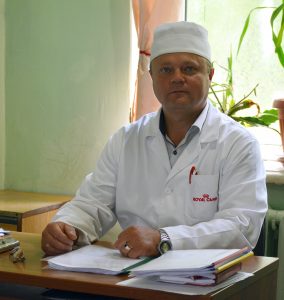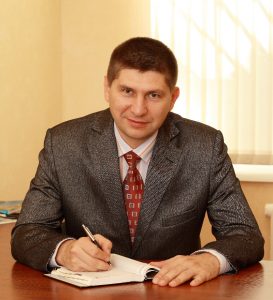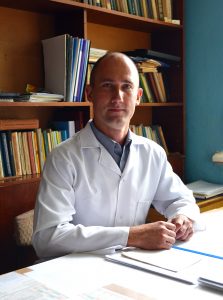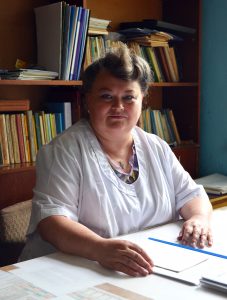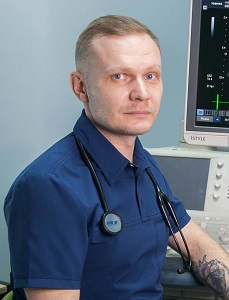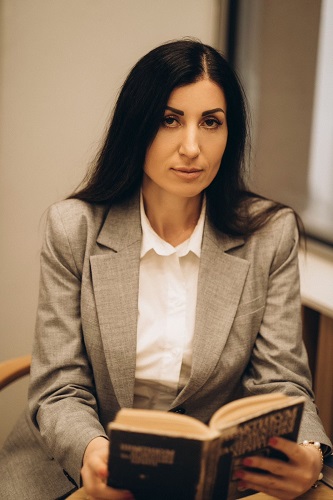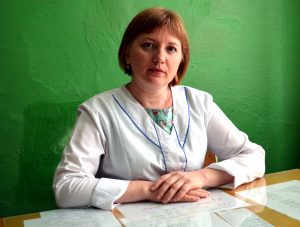Acting the head of the department
candidate of veterinary sciences, associate professor
Morozov Mykola
Personnel of the department
The list of subjects taught in the department:
• General and special surgery.
• Surgical diseases of animals with anesthesiology and first aid.
• Veterinary ophthalmology.
• Surgical surgery with the basics of topographic anatomy.
• History of veterinary medicine.
• Operative surgery with the basics of topographic anatomy and anesthesiology.
• Veterinary ophthalmology for dogs and cats.
• Practical obstetrics, gynecology and artificial insemination.
• Technology for reproduction of farm animals.
• Obstetrics, gynecology and animal reproduction biotechnology.
• Practical obstetrics, gynecology and artificial insemination of farm animals.
•Farriery.
History of the Department
The Department of Surgery was created together with the course of veterinary obstetrics in 1944. Its first head was Cand. wind. Sciences, Assoc. BV Makaveeva. During 1962–1966 the department was headed by Cand. biol. Sciences, Assoc. I. N. Guatto. In 1966, Dr. Vet was invited to head the department. of sciences, prof. OP Kosyh from the Buryat Agricultural Institute.
In 1972 it was decided to organize a separate department of surgery from the Department of Obstetrics and Artificial Insemination of Farm Animals, headed by Dr. Vet. of sciences, prof. A. F. Kuzmin. Under his leadership, intensive work began to improve the material and technical base of the department to improve the educational process and research. When transferring the department to the new educational building, the points of artificial insemination of farm animals were equipped, specialized laboratories for conducting classes and scientific laboratories (spectral and biochemical). On the advanced educational base, in addition to the training of veterinarians, at the initiative of the head of the department, training was provided for the technicians of artificial insemination of farm animals. Scientific activity of prof. O.F. Kuzmin and the staff of the reorganized department was directed to study the mechanism of influence of biogenic stimulants (tissue preparations, macro- and microelements, vitamins) on the organism of different types of farm animals in order to increase their fertility, meat, milk and wool productivity. The professor also conducted research on the study of the etiopathogenesis of infertility of cattle in the southern region of Ukraine, theoretically substantiated and practically proved the high efficiency of application for the prevention of infertility of cattle of complex organizational-economic and zoo-veterinary measures by creation of district farms. consisting of zoo veterinary specialists and dealing with infertility of cows and heifers on the basis of the circular system of artificial insemination of animals and widespread use in the system of obstetric and gynecological dispensary of biologically active substances. In 1982, the department of surgery was headed by Cand. wind. Sciences, Assoc. VP Balakirev, and the chair of obstetrics and artificial insemination of farm animals – Cand. agricultural Sciences, Assoc. OI Vlasov. In 1988, the Rectorate decided to combine the departments of surgery and obstetrics and artificial insemination of farm animals. The head of the reorganized department was appointed Cand. wind. Sciences, Assoc. GL Sologub, who held this position until 1999. During 1999–2001, the department was headed by Dr. Vet. of sciences, prof. OP Mikhailuk. From 2002 to 2010, the head of the department was Cand. wind. Sciences, Assoc. IS. F. Stanishevsky. During this period the department gets a new name – obstetrics and surgery. In 2010–2013, the duties of the Head were performed by Cand. wind. Sciences, Assoc. MG Morozov. In 2013-2020, the department has been headed by Dr. Vet. Sciences, Assoc. AV Telyatnikov. In 2017, the department was renamed the Department of Surgery, Obstetrics and Small Animal Diseases. Since 2020 the department was headed by K. vet. Associate Professor
Hierdieva Alona. In different years the department worked and works:
Professors: Kuzmin OF, Kosikh OP, Mikhailuk OP
Associate Professors: Makaveev VV, Guvato IN, Voronin IV, Petrukhin PI, Demchenko ND, Balakirev VP, Bugaeva NP, Ershov VD, Kovalak A.G., Sologub G.L., Vlasov A.I., Stanishevsky E.F., Dronchak A.Y., Rozum L.M., Morozov M.G., Telyatnikov A.V., Rozum E.E., Hierdieva A.O.
Senior Lecturers: Plosk VP, Kramarchuk AG, Kaliberda VG, Chekanovich GO, Ploski EV
Assistants: Maximova MS, Yusov YV, Lukyanchuk OO, Artemenko VV, Yankov OP, Volkanova NV, Zhurin IV, Zhornik DV, Kryvyi MF, Pustovit RV, Gordienko DD, Vitrichenko DP, Pokhvatko OM, Roman LG, Ushakov OS, Franchuk LO
Senior laboratory assistants and veterinarians of the Department:Volkovskaya GM, Bryukhanova TI, Yakhedi OF, Kapustin OB, Martinova VP, Irinchuk NV, Dobryanska AL, Minkina OM, Zhekov L .S., Tsushko TP, Boyko GO, Safronova TL, Shkolina OL, Khodzhikian DR, Karpukhina KV.
During the existence of the department three doctoral and 24 PhD theses were completed and defended. In particular, during 2003–2019 the degree of Doctor of Science was awarded to AV Telyatnikov, the candidate – AV Telyatnikov, MG Morozov, RV Pustovit, EE Rozum, DV Zhornik, A.O. Hierdieva. Today, the research work of the department is aimed at monitoring the occurrence, spread and course of surgical and obstetric-gynecological diseases, the study of pathogenesis, the development of effective methods of diagnosis, treatment and prevention of diseases in the south of Ukraine. Scientific researches of the department staff are carried out directly at the production. The basis for such research are farms and private farms in Odessa and other regions of southern Ukraine, as well as veterinary clinics in Odessa, with which the department maintains a permanent, close relationship. The scientific and pedagogical staff of the department are working on the development of means and methods of accelerating the healing of bone injuries in animals associated with the stimulating activity of metal nanoparticles during the metabolism. Introduction of computed tomography studies into the practice of veterinary surgery for small pets. Methods for diagnosis, treatment and prevention of eye diseases in farm and small pets are being improved. Research is being conducted on the spread, clinical course, improvement of methods of diagnosis, treatment and prevention of surgical diseases in agricultural and small animals. associated with the stimulating activity of metal nanoparticles during metabolism. Introduction of computed tomography studies into the practice of veterinary surgery for small pets. Methods for diagnosis, treatment and prevention of eye diseases in farm and small pets are being improved. Research is being conducted on the spread, clinical course, improvement of methods of diagnosis, treatment and prevention of surgical diseases in agricultural and small animals. associated with the stimulating activity of metal nanoparticles during metabolism. Introduction of computed tomography studies into the practice of veterinary surgery for small pets. Methods for diagnosis, treatment and prevention of eye diseases in farm and small pets are being improved. Research is being conducted on the spread, clinical course, improvement of methods of diagnosis, treatment and prevention of surgical diseases in agricultural and small animals.
The intensity of wound processes in animals with the development of purulent infection and endogenous intoxication under the influence of amber therapy is studied, as well as methods and ways of introduction into the body of animals of succinic acid and preparations based on it. Methods of surgical treatment, prophylaxis and screening for dogs’ dirofilariosis are being developed.
The effectiveness of the use of modern specific and nonspecific therapies to restore the reproductive capacity and milk productivity of infertile and mastitis animals is conducted. The effectiveness of various methods of increasing the reproductive capacity and improving the diagnosis and treatment of postpartum diseases in females are studied. animals. The therapeutic efficacy of various agents in mastitis in animals, diseases of pregnant women and their effect on the condition of newborns is investigated.
